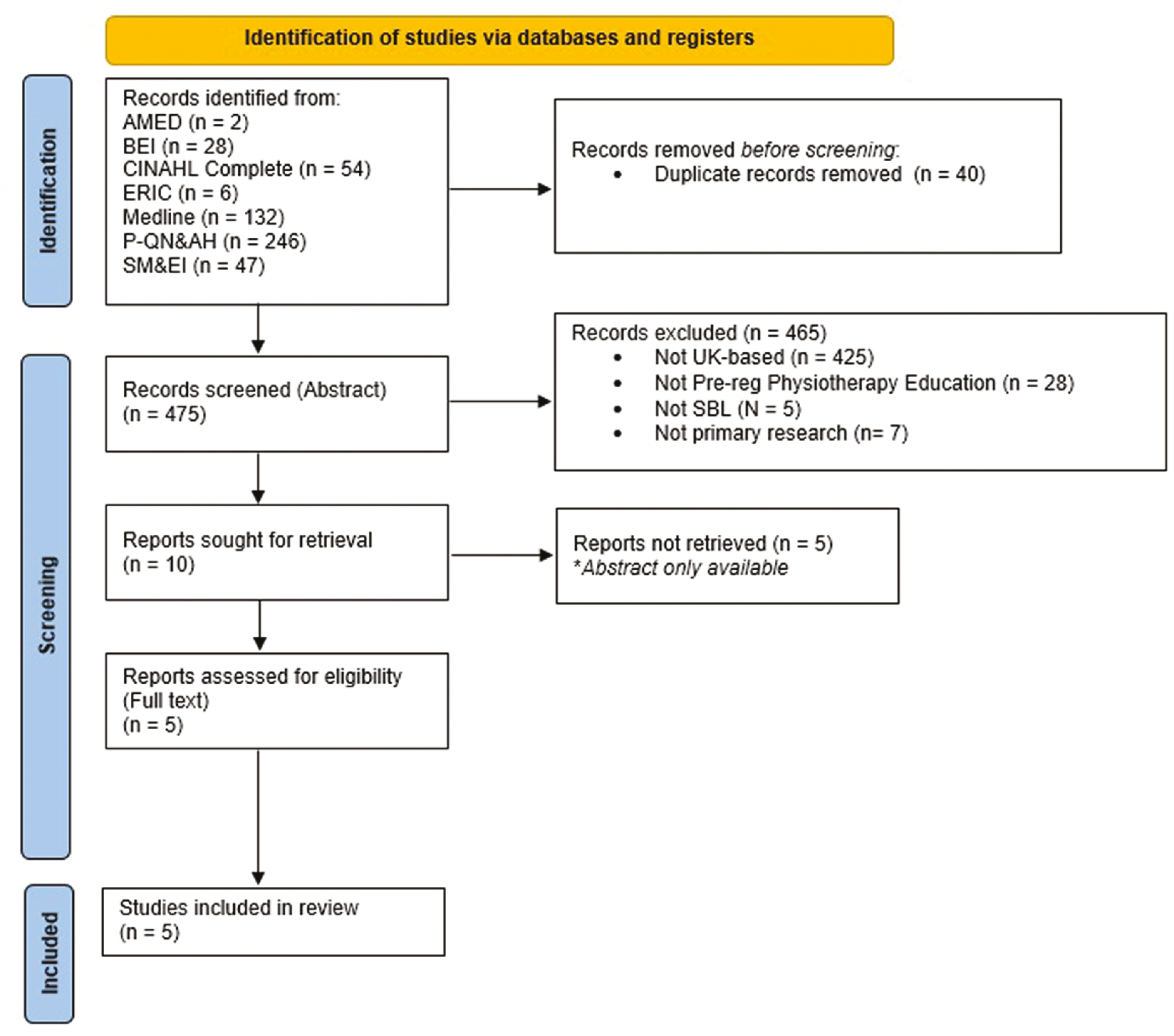
Whilst predominantly informed by research from international education systems, Simulation-Based Learning (SBL) is becoming increasingly present within the curriculum of UK Pre-registration Physiotherapy degree programmes [1]. However, due to variability in reporting of study methodology little is known about ‘How, Why and When?’ SBL is being used within these programmes [2]. This scoping review aimed to identify trends around ‘How, Why and When?’ SBL is being used, in an effort to clarify current practice and provide a UK focused perspective to the current evidence base.
Considered the most appropriate research method for addressing the aims of the study, a scoping review was undertaken. The databases AMED, British Education Index, CINAHL Complete, ERIC, Medline, Pro-Quest Nursing & Allied Health, and Sports Medicine & Education Index were searched using a combination of words and synonyms representing the review Population (Physiotherapy Students), Concept (Simulation-Based Learning) and Context (Pre-registration Education). All peer-reviewed primary research studies undertaken from 2013-2023, published in English and concerning UK-based Physiotherapy educational practice were included.
Of the 475 studies identified from the databases, only 10 met the criteria for review on screening. Of these, only 5 were available as full text and so eligible for full review, Figure 1-A84. These studies were published between 2016 and 2023, with a predominantly qualitative study design. ‘How?’ SBL was used varied in modality, fidelity and structure, with limited detail provided, especially in relation to pre-and debrief activities. ‘Why?’ SBL was used was mostly in pursuit of a combination of clinical knowledge and technical/ non-technical skills. ‘When?’ SBL was used ranged across the academic levels (First to Final year); only one study provided data on programme of study i.e. BSc (Hons). Three studies did however provide contextual background information in relation to previous educational experiences, to suggest where participants were in their academic journey.


The limited number of studies that met the review criteria, variability in reporting of study methodology (‘How’ & ‘When’), and the variety of research aims (‘Why’) prevents a clear consensus being achieved as to the current use of SBL in UK Pre-registration Physiotherapy degree programmes at this time. Whilst recognising weaknesses in the sensitivity of this review’s search strategy [3], the outcome suggests that a more active research agenda within UK Physiotherapy education, one that promotes the publication of studies examining the role of SBL in pre-registration programmes, is currently needed.
Authors confirm that all relevant ethical standards for research conduct and dissemination have been met. The submitting author confirms that relevant ethical approval was granted, if applicable.
1. Heneghan NR, Radones M, Herbland A. Simulation in pre‐registration physiotherapy education: a scoping review. HSK Research Conference. University of Hertfordshire. 2022.
2. Roberts F, Cooper K. Effectiveness of high fidelity simulation versus low fidelity simulation on practical/clinical skill development in pre-registration physiotherapy students: a systematic review. JBI Evidence Synthesis. 2019;17(6):1229–1255.
3. Peters MD, Marnie C, Tricco AC, Pollock D, Munn Z, Alexander L, McInerney P, Godfrey CM, Khalil H. Updated methodological guidance for the conduct of scoping reviews. JBI Evidence Synthesis. 2020;18(10):2119–2126.